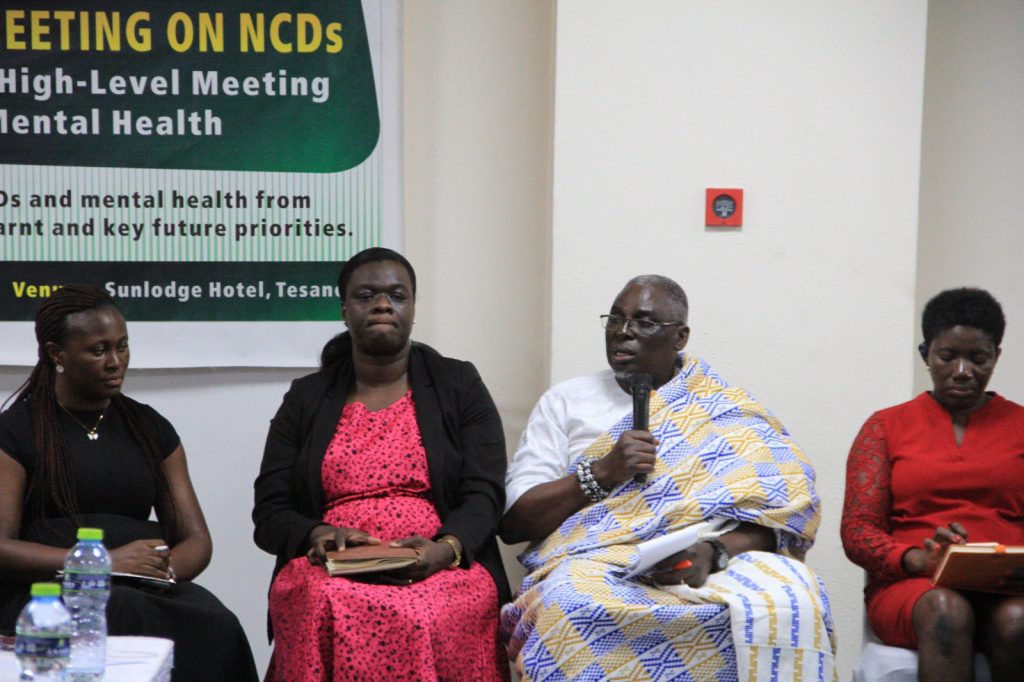|
Getting your Trinity Audio player ready...
|
Dr Ignatius A.N. Awinibuno, Chief Programme Officer (Director) Allied Health, Ministry of Health has called on stakeholders in health to collaborate to seek financial solutions to address challenges of non communicable diseases (NCDs).
He said, “Collaboration is the way to go. Multi-sectoral collaboration is very important. The silos approach does not bring synergy, and we end up duplicating and competing unhealthyly instead of using our potentials to maximise the limited resources we have.”
Dr Awinibuno made the call in an address at a stakeholders’ meeting on NCDs ahead of the 4th UN High Level Meeting on NCDs and Mental Health organised by the Ghana NCD Alliance in Accra. It was on the theme, “Ghana’s progress on NCDs and mental health from 2018 to 2025: Lessons learnt and key future priorities.”
The meeting was attended by representatives from the National Health Insurance Authority, Mental Health Authority, PharmaAccess, Ghana Health Service-NCD Programme, civil society organisations, traditional leaders, and persons with live experience of NCDs
Dr Awinibuno said addressing the social determinants of health, essential matters of environment, creating finance, and local governance required an integrated holistic approach. “I therefore urge all sectors to collaborate actively to ensure that our strategies do not remain siloed but rather contribute to robust national response.
“Financing NCDs prevention and care remains a critical issue and that it is imperative that we represent a unified strategic position that reflects our progress and aspirations at the UN High Level Meeting in September, 2025,” the Director said. Dr Awinibuno said since 2018 the Ministry of Health had embarked on significant initiatives aimed at curbing the surge in NCDs, and that followed their commitment to achieving universal health coverage.
He said while the government had made some commendable progress in health and the launch of the MahamaCare, there was the need for stakeholders to come together to also confront the barriers that persist, thus the limited financial commitment. Dr Awinibuno asked the stakeholders to resolve to advocate concrete financing commitment including the reactivation of the NCD Fund set out in Ghana’s National Policy Strategy.
“That will require that all sectors contribute to it. Government alone cannot do it. We know there are philanthropists who can do it, but there is the need for a clear mechanism that targets where the support should go,” he stated. He said, “While challenges we face in the fight against NCDs are daunting, I have the unwavering faith in our collective capabilities to enact a meaningful change.”
Dr Awinibuno commended the Ghana NCD Alliance and its global partners for convening the national conversation on NCDs and mental health to seek views from all stakeholders to inform Ghana’s contribution at the 4th UN High Level Meeting in September, 2025.
Dr Beatrice Wiafe-Addae, the Chairperson of the Ghana NCD Alliance in a speech read on her behalf urged stakeholders to reaffirm their commitment to building a healthier Ghana where NCDs and mental health receive attention, resources, and support they deserve.
She said, “We cannot do all these things without neglecting environmental factors because a study by the World Health organisation shows that reducing environmental factors will help prevent NCDs.”
Dr Wiafe-Addae called on health advocates to engage in meaningful dialogue, foster partnerships, and identify actionable priorities that would not only align with global initiatives, but also address the unique means of Ghana.
“Data shows that nearly 19 percent of Ghanaians have mental illness while 41 per cent have some form of psychological distress. This is scary in our population of 32 million. A fear is escalated by apathy and inertia.
“Together, we have the power to shape the trajectory of our nation’s health landscape,” she said, adding that, “ As we prepare for the 4th UN High Level Meeting, let us reaffirm our commitment to building a healthier nation.”.
Source: GNA


